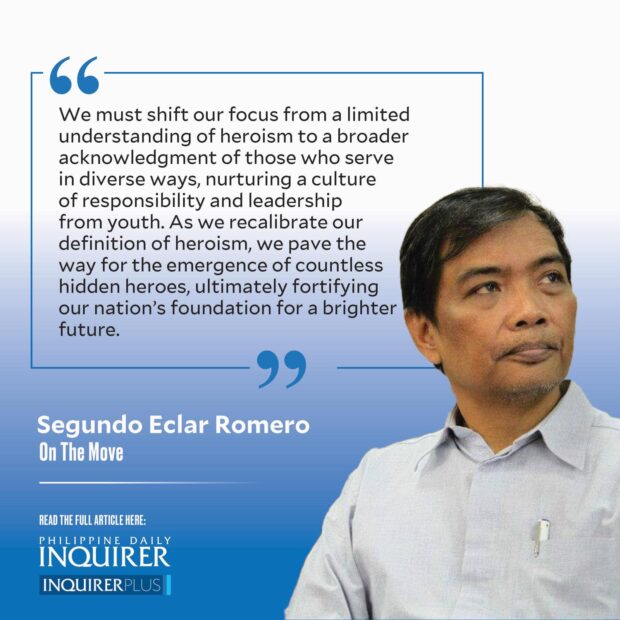Fostering unsung heroism in the Philippines
One thing I am certain of, our nation is yearning for heroes. As we cast our gaze backward, we find ourselves repeatedly drawn to historical epochs such as the Philippine Revolution, World War II, and the Edsa People Power Revolution for our heroic icons. When our national anthem is sung, the usual accompanying imagery — Filipino soldiers trudging the Death March, Lapulapu felling Magellan, and the valiant fighters of the Philippine Revolution — evokes a sense of dull admiration that highlights a yearning for fresh heroism.
Remarkably, our interpretation of the phrase “ang mamatay nang dahil sa iyo” (“to die in your cause”) in “Lupang Hinirang” has veered toward the literal, elevating sacrifice above all other forms of heroism. This perception, though grounded in the monumental sacrifices of figures like Jose Rizal, Jose Abad Santos, and Benigno S. Aquino Jr., has marginalized countless others who have made substantial contributions to our society without offering their lives. Among these unsung champions are teachers, students, extension workers, community leaders, farmers, entrepreneurs, innovators, researchers, scientists, journalists, government officials, and civil society leaders who, in the shadows, toil to enhance our collective well-being.
Article continues after this advertisementThese unsung heroes act as the linchpin of community resilience and progress. Amid emergencies and disasters, they selflessly volunteer their time and energy. They assume leadership roles, cultivate cleaner and safer neighborhoods, and initiate tree-planting campaigns. They uphold the pillars of justice by bearing witness against crime and corruption, and they courageously confront those who perpetrate illegal and harmful actions in public spaces. Through their diligent work and daily lives, they personify responsibility and accountability.
Paradoxically, our lofty standards for heroism blind us to the heroes dwelling among us. This oversight stems from our lack of a structured process for hero cultivation. Other nations, such as China and Vietnam, cultivate heroes from an early age through programs like the Young Pioneers, fostering leadership potential, consciousness, and pride. This approach isn’t limited to socialism; it finds roots in the Boy Scouts movement initiated by Lord Robert Baden Powell. Regrettably, this noble concept has been subverted by politicians for personal gain, preventing its full realization in the Philippines.
Our nation requires a broader preparation for national service, one that embraces diverse avenues of contribution. The proposed resurrection of the Reserve Officers’ Training Course signals a positive step forward, but its scope should transcend military-centric training. The National Service Reserve Corps (NSRC) created by virtue of Republic Act No. 9163 known as the National Service Training Program or NSTP Act of 2001 is a better civic development model. Unfortunately, since the enactment of the NSTP law in 2001 until 2011, the NSRC was never organized and mobilized despite the issuance to that effect of a joint memorandum by the Department of National Defense, the Commission on Higher Education, and the Technical Education and Skills Development Authority.
Article continues after this advertisementYet, the need for the NSRC keeps being affirmed. RA 10121 known as the Philippine Disaster Risk Reduction and Management Act of 2010 provides that the NSRC be accredited and mobilized for disaster risk reduction and management in the country.
It is time the NSRC is mobilized in earnest. It would provide the opportunity for youth civic engagement, guiding our young generation toward a profound understanding of duty and service and rekindling the spirit of patriotism.
Furthermore, initiatives like the Red Cross volunteers, the 4H Club, and the Young Farmers Challenge Club can captivate the imagination of our youth, offering platforms to acquire emergency skills and foster a sense of civic responsibility.
In my personal journey, I have had the privilege of encountering heroes whose contributions resonated deeply. Icons like Ninoy Aquino, Salvador P. Lopez, and Jesse Robredo have left an indelible mark on me. Yet, even beyond those I knew personally, I draw inspiration from figures like Wenceslao Vinzons, Maria Orosa, Juan Flavier, and Albert del Rosario, whose contributions have transformed the nation in profound but often uncelebrated ways.
In sum, the Filipino narrative of heroism must expand its envelope to encompass the quiet champions who stand resolutely behind the curtains of history. True heroism transcends self-interest and demands our attention. We must shift our focus from a limited understanding of heroism to a broader acknowledgment of those who serve in diverse ways, nurturing a culture of responsibility and leadership from youth. As we recalibrate our definition of heroism, we pave the way for the emergence of countless hidden heroes, ultimately fortifying our nation’s foundation for a brighter future.

















